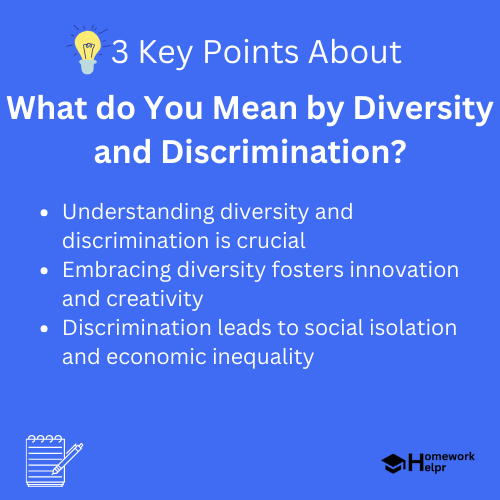📝 Summary
Diversity refers to the presence of differences among individuals in various aspects like race, gender, and socio-economic background. It fosters innovation, creativity, and better problem-solving in communities and organizations. On the other hand, discrimination is the unjust treatment of people based on their attributes, leading to inequalities and negative consequences like social isolation and mental health issues. Embracing diversity and combating discrimination is essential for building a peaceful and inclusive society where everyone feels valued and respected.
What do You Mean by Diversity and Discrimination?
Diversity and discrimination are two critical concepts that shape our world. Understanding these terms is essential for fostering a peaceful and inclusive society. This article aims to explore what diversity means, how it manifests in our daily lives, and the implications of discrimination. By the end, you will have a clearer understanding of these vital issues.
Understanding Diversity
Diversity refers to the presence of differences within a given setting. This can include differences in race, ethnicity, gender, age, sexual orientation, physical abilities, and socio-economic background. In other words, diversity embodies a rich mix of people with various experiences and perspectives. It is vital for organizations, communities, and societies as it drives innovation and creativity.
Diversity is not just a statistic; it significantly affects our interactions with one another. In diverse environments, people bring unique viewpoints and skills that enhance problem-solving and decision-making processes. For example, in a group of students working on a project, a diverse team is more likely to generate a variety of ideas, leading to more comprehensive solutions.

The Importance of Embracing Diversity
Embracing diversity has numerous benefits. It leads to enhanced understanding and appreciation among people, ultimately contributing to a cohesive society. Here are some key advantages:
- Increased Creativity: Different perspectives inspire new ways of thinking.
- Better Decision Making: A group with diverse opinions tends to make more informed choices.
- Greater Innovation: Diverse environments foster creativity, resulting in unique products and services.
For example, companies with diverse workforces often outperform those lacking diversity. This is because they tap into a wider pool of experiences and ideas that can lead to groundbreaking inventions.
Definition
Diversity: The condition of having a range of different elements; in this context, it refers to the various qualities and characteristics that exist within a group.
Examples
If a school consists of students from different countries and cultures, that school is considered diverse. Students can share their traditions, languages, and experiences, enriching the learning environment for everyone.
What is Discrimination?
Discrimination is the unjust treatment of different categories of people, especially based on attributes such as race, gender, or age. It can appear in various forms, including social, political, and economic contexts. Discrimination often leads to inequalities that can have long-lasting impacts on individuals and communities.
There are various categories of discrimination, such as:
- Racial Discrimination: Treating someone differently because of their race.
- Gender Discrimination: Unequal treatment based on gender, affecting primarily women and girls.
- Age Discrimination: Treating individuals unfairly due to their age, often against older individuals.
Discrimination can manifest in different spheres, including employment, education, and public services. For instance, a person may not be hired for a job solely because of their ethnicity, which demonstrates racial discrimination. Such behavior not only affects the individuals involved but also undermines the values of equity and justice.
Definition
Discrimination: The prejudicial treatment of different categories of people, especially on the grounds of race, age, or sex.
Examples
If two students with the same qualifications apply for a scholarship, but one is rejected solely due to their background, this is an example of discrimination.
The Consequences of Discrimination
Discrimination leads to several negative consequences that impact individuals, communities, and society as a whole. These consequences include:
- Social Isolation: Discriminated individuals often feel marginalized and disconnected from society.
- Economic Inequality: Discrimination may prevent capable individuals from pursuing job opportunities, leading to wage gaps.
- Mental Health Issues: Discrimination can lead to feelings of worthlessness and depression, severely affecting mental health.
These repercussions illustrate why it’s critical to combat discrimination proactively. By acknowledging and celebrating diversity, we can help reduce the instances of discrimination in our communities.
❓Did You Know?
Did you know that diverse teams are 35% more likely to outperform their competitors? Diverse viewpoints can directly improve problem-solving and innovation!
How to Foster Diversity and Combat Discrimination
Championing diversity while fighting discrimination is not the sole responsibility of specific organizations or government bodies; it requires collective effort from individuals, communities, and leaders. Here are some actionable strategies:
- Educate Yourself: Learning about different cultures and experiences helps build empathy and understanding.
- Speak Out: If you witness discrimination, whether in school or at work, speak up. Silence can contribute to the problem.
- Promote Inclusion: Encourage inclusive practices in your community or workplace. Celebrate cultural events and encourage participation from everyone.
By implementing these strategies, we can take steps towards a more inclusive society where everyone feels valued and respected.
Conclusion
In conclusion, the concepts of diversity and discrimination are deeply intertwined and highly relevant in today‚’ world. Diversity enriches our lives and communities, while discrimination poses significant challenges. By understanding these terms and their implications, we can work together to create a more inclusive and respectful society. Let’s celebrate our differences and stand against discrimination, paving the way for a brighter future for everyone.
Related Questions on What do You Mean by Diversity and Discrimination?
What is diversity?
Answer: Diversity refers to the presence of differences among individuals.
What is discrimination?
Answer: Discrimination is the unjust treatment based on attributes.
How can we combat discrimination?
Answer: Educate, speak out, and promote inclusion.
Why is diversity important?
Answer: Diversity enhances creativity and improves decision-making.
